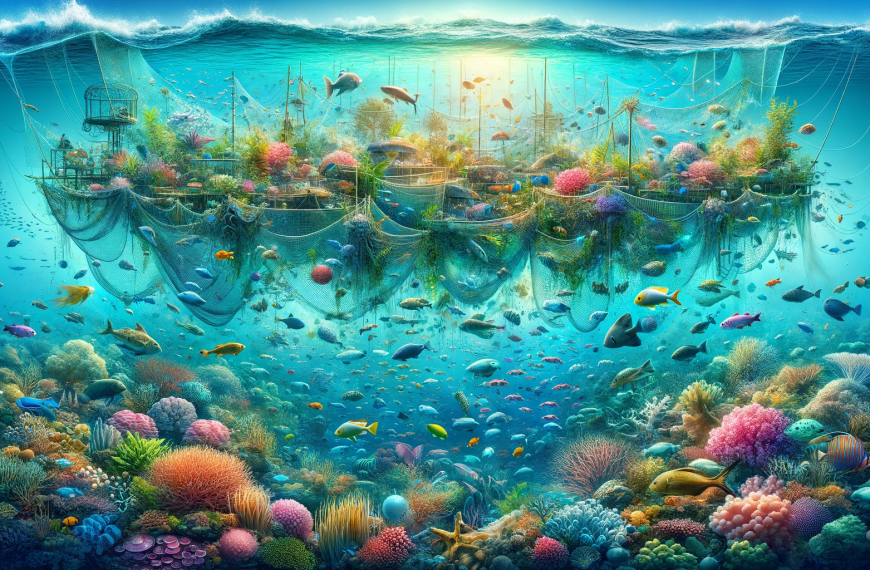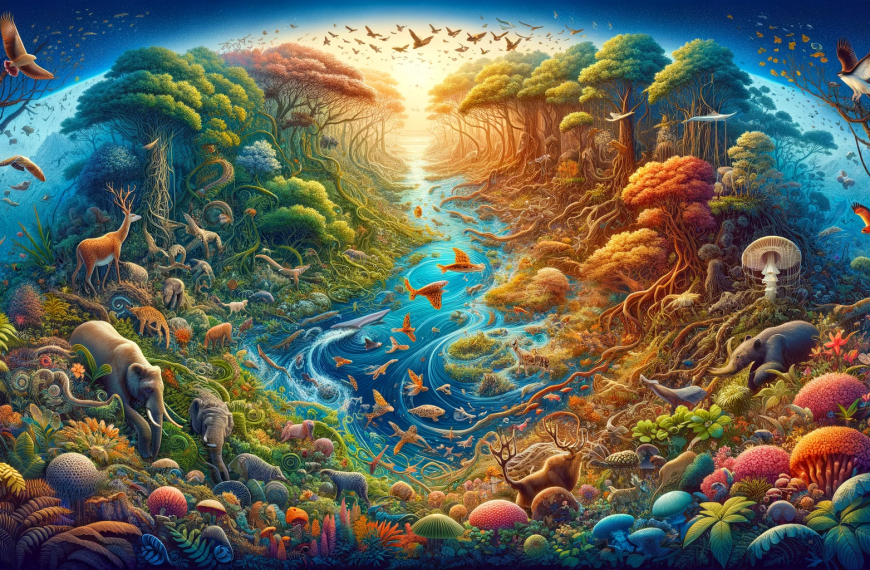At King Mongkut’s University of Technology Thonburi (KMUTT), sustainability is at the heart of our mission, and we recognize the critical importance of protecting and conserving the world’s oceans, seas, and marine resources. Sustainable Development Goal 14 (SDG 14), which calls for the conservation and sustainable use of oceans, seas, and marine resources, aligns with the university’s core values and research initiatives. As we look towards 2024, KMUTT is committed to advancing marine conservation, promoting sustainable ocean practices, and contributing to the global effort to protect marine ecosystems and ensure the sustainable use of marine resources.
Research and Innovation for Marine Conservation
KMUTT’s research community is deeply engaged in tackling challenges related to marine sustainability, with a focus on the preservation of marine ecosystems and the responsible use of marine resources. The university is home to cutting-edge research initiatives aimed at addressing the pressing issues facing our oceans, such as pollution, overfishing, and habitat destruction. Through interdisciplinary collaboration across various fields—including environmental science, marine biology, and engineering—KMUTT is pioneering innovative solutions that help conserve marine life and ensure sustainable management of the seas.
Sustainable Fisheries and Marine Resources Management
Sustainable management of fisheries and marine resources is another key area of focus for KMUTT. The university recognizes the critical role that healthy oceans play in supporting livelihoods and food security, particularly in coastal communities. Through partnerships with local and international organizations, KMUTT researchers are developing strategies for sustainable fisheries management, aiming to prevent overfishing, protect marine biodiversity, and support the resilience of marine ecosystems.
Collaboration for Marine Conservation and Policy Advocacy
KMUTT’s approach to marine sustainability is not limited to research alone—it extends to active collaboration with various stakeholders, including government bodies, local communities, NGOs, and private enterprises. The university is involved in several marine conservation initiatives that promote collaborative action for the protection of oceans and coastal ecosystems.
In addition to academic education, KMUTT organizes community engagement activities that raise awareness about the importance of sustainable ocean practices. Through public outreach, workshops, and volunteer initiatives, the university encourages students, staff, and the wider community to take action in protecting marine environments. These initiatives often focus on coastal cleanup efforts, educational campaigns on plastic waste, and sustainable consumption practices related to seafood.
Promoting Sustainable Coastal Development
KMUTT’s commitment to SDG 14 also involves promoting sustainable coastal development. As coastal areas face growing pressure from urbanization, industrial activities, and climate change, the university is engaged in research that promotes the sustai
In 2024, King Mongkut’s University of Technology Thonburi (KMUTT) remains committed to the conservation and sustainable use of oceans, seas, and marine resources. Through cutting-edge research, collaborative partnerships, and educational initiatives, the university is actively contributing to SDG 14 by addressing critical marine challenges such as pollution, overfishing, and habitat degradation.
As KMUTT continues its work to protect and preserve the world’s oceans, the university’s efforts align with global calls for urgent action to combat climate change and its impacts on marine ecosystems. By integrating sustainable practices into both academic and community activities, KMUTT is playing a crucial role in shaping a future where the oceans, seas, and marine resources are not only protected but also utilized in a way that ensures sustainable development for generations to come.
14.2 SUPPORTING AQUATIC ECOSYSTEMS THROUGH EDUCATION
1. Related information on our university offering educational programmes on fresh-water ecosystems (water irrigation practices, water management/conservation) for local or national communities.
KMUTT offers education programs in irrigation, water conservation and water management more than 6 program, such as:
- Water Resources Engineering program, Department of Civil Engineering, Faculty of Engineering
- Environmental Engineering program, Department of Environmental Engineering, Faculty of Engineering
- Environmental Technology program, School of Energy, Environment and Materials, Environment
- Climate Change and Sustainability program, Joint Graduate School of Energy and Environment
- Environmental Technology & Management, Joint Graduate School of Energy and Environment
- Natural Resource Management Program, School of Bioresources and Technology
- Etc.
For more information https://www.kmutt.ac.th/en/education/curriculum/
Moreover, the university has been actively integrating its expertise in irrigation, water conservation, and water management to address the growing challenges of water scarcity and ensure long-term sustainability in surrounding communities. Through research, innovation, and collaboration with local stakeholders, the university has developed and implemented various strategies aimed at optimizing water use and improving agricultural productivity in water-scarce regions.
KMUTT leads an initiative to support communities in Khiriwong and surrounding areas in developing a master plan for small water turbines for water management. This effort, involving community input, aims to expand small turbine use for electricity generation and effective water resource management. The master plan addresses seasonal and year-round needs, as some villagers rely on turbines during fruit harvests while others use them consistently due to their remote locations. The project, led with collaboration from local officials and technical students, brings together stakeholders such as government and private entities. the Khiriwong Water Turbine Community Enterprise Group highlights how the turbines alleviate drought issues, especially during the dry season. Phatthalung’s provincial energy officer, Mr. Arun Inthasara, underscores the importance of integrating provincial resources to support water turbine and solar energy initiatives. KMUTT has already installed over 140 small water turbines in Khiriwong, generating more than 91 kilowatts of power. The master plan also seeks to foster local expertise in hydroelectric technology, encouraging sustainable energy practices and enabling community-led water management for a sustainable future
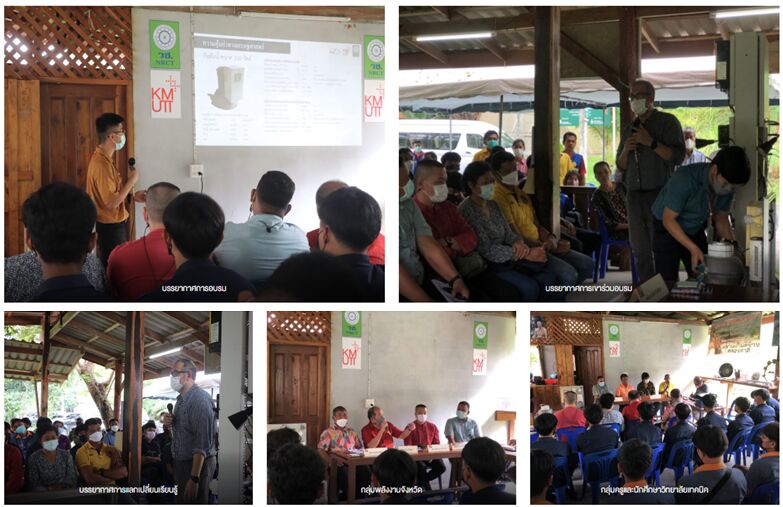
2. Related information on our university offering educational programme / outreach for local or national communities on sustainable management of fisheries, aquaculture and tourism.
KMUTT offers education programs in sustainable management of fisheries, aquaculture and tourism such as Aquaculture Engineering program and Offshore Engineering program. For more information https://www.kmutt.ac.th/en/education/curriculum/
KMUTT actively contributes to the dissemination of knowledge to local communities, focusing on sustainable fisheries management, aquaculture practices, and the promotion of water tourism. Sustainable management of fisheries and aquaculture is crucial to address water scarcity and ensure long-term food security, especially in water-scarce regions. King Mongkut’s University of Technology Thonburi (KMUTT)’s ongoing efforts to conserve and manage water through research, innovation, and collaboration with local stakeholders are in line with its goal of promoting sustainability in aquaculture systems. KMUTT has applied its expertise in biotechnology and water management to develop water-efficient strategies to increase aquaculture productivity.
The Environmental and Energy Management for Communities and Circular Economy (EEC&C) Research Group conducted fieldwork with researchers on the project A framework for sustainable aquaculture within peri-urban green infrastructures protecting the Gulf of Thailand from eutrophication, which received research funding from the Biotechnology and Biological Sciences Research Council, UK, at the Song Nam Chaipattana Farm in Chachoengsao.

KMUTT, in collaboration with several organizations, hosted a training session on environmental genetic sequencing for sustainable aquaculture and water quality management technologies. The event, held at the KPR Building on the first floor of the Klong Khuean Development Center, was conducted under the Royal Initiative. The session aimed to deepen participants’ understanding of how scientific technologies and methods can be applied to improve and sustainably manage water quality in aquaculture systems. Additionally, the Thailand-UK Joint Research Project, EEC&C Research Group, Newcastle University, and BBSRC took part in an important conference where they shared their research findings. The session was officially opened by Associate Professor Dr. Soidaw Winitchanantarat, Head of the EEC&C Research Group, during The International Symposium on Water Quality and Aquaculture Farming Research in Coastal Areas.

3. Overfishing (community outreach)
Thailand’s marine and coastal areas are biodiversity hotspots, particularly for marine mammals like dolphins and whales, which play a vital role in nutrient cycling and maintaining ecological balance. However, these animals face threats from climate change and human activities, such as entanglement in fishing nets, vessel collisions, habitat loss, and marine pollution. The Irrawaddy dolphin (Orcaella brevirostris), in particular, is at risk of extinction, which impacts the health and biodiversity of marine ecosystems.
KMUTT, in collaboration with government agencies and academic institutions, has launched a research project to study the Irrawaddy dolphin in Thailand and Indonesia. This project aims to understand the effects of human activities and climate change on dolphin populations. The Irrawaddy dolphin, as a top predator, plays a critical role in nutrient storage and cycling within the food chain. A decline in this dolphin population directly affects the abundance and biodiversity of marine ecosystems. Conserving the Irrawaddy dolphin is essential for maintaining biodiversity. KMUTT and its partners employ molecular biology techniques to develop genetic markers and use environmental DNA (eDNA) to identify feeding areas of dolphins and whales. This research helps designate key conservation areas and reduce fishing-related threats, particularly from overfishing, illegal and unreported fishing, and destructive fishing practices.
Raising awareness about conservation and reducing the impact of unsustainable fishing is crucial to preserving biodiversity and restoring key marine species. Achieving sustainable conservation and development of marine and coastal resources also requires collaboration with neighboring countries and the development of effective monitoring tools to track ecological changes, strengthening conservation efforts at national and regional levels.
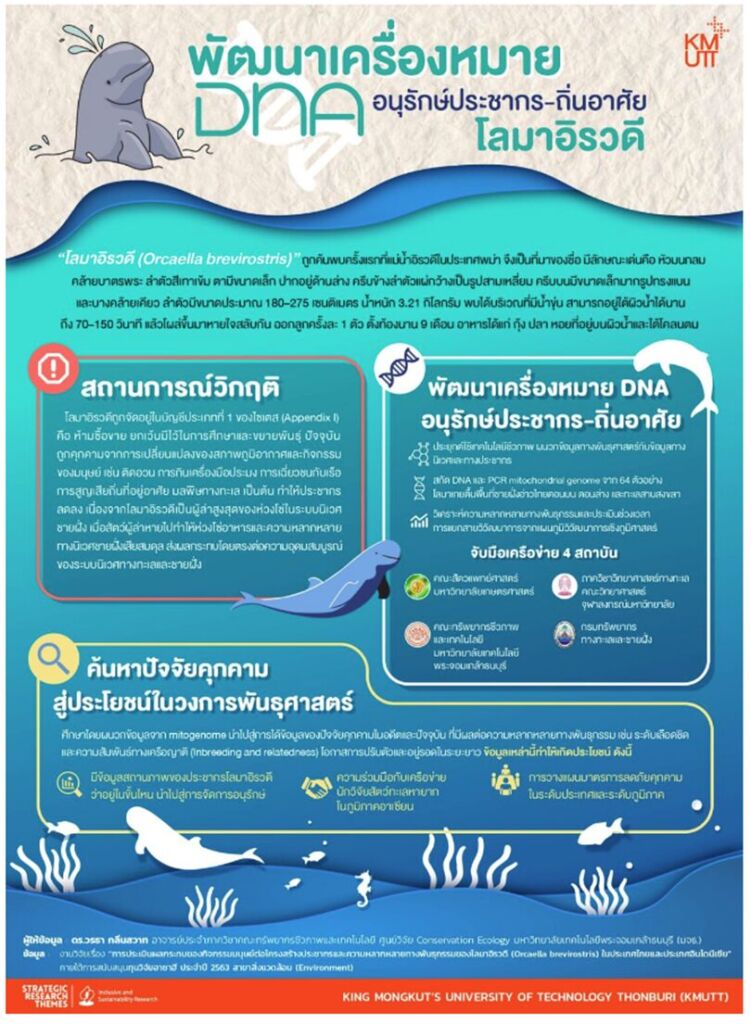
14.3 SUPPORTING AQUATIC ECOSYSTEMS THROUGH ACTION
1. Related information on our university offering educational programmes on fresh-water ecosystems (water irrigation practices, water management/conservation) for local or national communities.
KMUTT as a body organise various events aimed to promote conservation and sustainable utilisation of the oceans, seas, lakes, rivers and marine resources. The Student Council of the Faculty of Science organized the 2nd Nature and Environment Conservation Camp (ENVI-SCI #2) at the Marine Science and Conservation Center, Saensarn Subdistrict, Sattahip District, Chonburi Province. The objectives were to provide knowledge and instill a good attitude towards the conservation of natural resources and the environment, focusing on reducing problems in the marine environment, and enabling students to learn and adapt to live with nature appropriately. Asst. Prof. Dr. Nakarin Phatthanabunmee, Deputy Dean for Student and Learning Development, presided over the opening ceremony, and Assoc. Prof. Dr. Phongsak Khunrae, the activity advisor, gave a speech and gave encouragement to the students who participated in the camp activities, which included Ice Breaking, theoretical diving equipment training for marine conservation, a lecture on “The Origin of Coral Reef Biology, Problems, Impacts, and Restoration,” recreational activities to build relationships and instill conservation awareness, coral planting to conserve coastal coral reefs, diving to study the coral ecosystem, and studying sea turtle conservation at the Turtle Conservation Center. Ms. Buasai Phetsuriyawong, the activity advisor, gave a closing speech and presented awards for each activity group’s presentation. This activity had 75 teachers and undergraduate students from years 1-4 interested in participating.
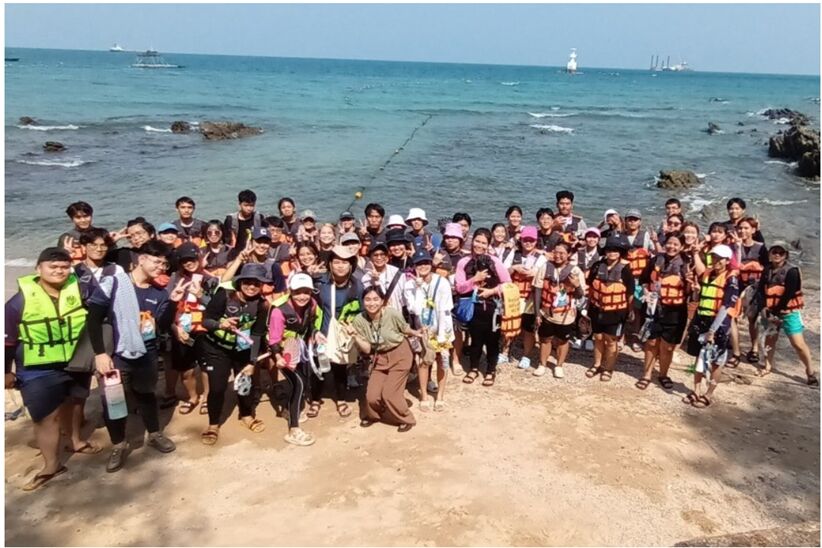

In addition, KMUTT organizes mangrove planting activities, inviting students, personnel, and local communities to participate in water resource conservation efforts. Through these activities, participants directly experience the essential role of mangrove forests in coastal ecosystems. This initiative strengthens KMUTT’s connection with surrounding communities while actively promoting the conservation and sustainable use of oceans, seas, and marine resources. Mangroves act as natural barriers, protecting coastlines from erosion and buffering against storm impacts and rising sea levels. Restoring and expanding mangrove forests also contribute significantly to climate change mitigation by absorbing carbon. Moreover, mangroves provide critical breeding grounds and habitats for diverse aquatic species, birds, and other wildlife, thereby enhancing biodiversity. They also support local communities by offering potential future food sources and maintaining healthy ecosystems that benefit both people and nature. Through these activities, KMUTT aims to promote a deeper understanding and commitment to conservation efforts that sustain marine resources and foster resilient ecosystems for the benefit of people and nature alike.
2. Related information on our university offering educational programme / outreach for local or national communities on sustainable management of fisheries, aquaculture and tourism.
The Food Safety Center at KMUTT is committed to promoting safe and sustainable food practices and policies to ensure that all food on campus from aquatic ecosystems is sustainably harvested, with a focus on food safety and risk management. The Center aims to minimize environmental impacts through rigorous standards and risk assessment frameworks for food production. This policy is in line with the Center’s mission of maintaining high food safety standards while supporting environmental health. The Center provides training in sustainable practices such as hygiene, risk assessment, and compliance with protocols such as Good Manufacturing Practice (GMP) and Hazard Analysis and Critical Control Point (HACCP) as well as ISO standards such as ISO 22000 to ensure that food service providers on campus are prepared to meet sustainability criteria. The Center also collaborates with government agencies, the private sector, and research organizations to promote research and development on food safety innovations, supporting efficient and environmentally friendly food systems to protect both local and broader ecosystems. Through these efforts, the Food Safety Center contributes to the creation of a safe and sustainable food supply on campus and promotes responsible food sourcing practices that benefit aquatic ecosystems.
Food Food Safety Center
Vision : Create and develop research, support the transfer of food safety technology
Scope of work : The Food Safety Center is ready to conduct research, develop and transfer food safety technology, assess food safety risks, and intervene to reduce risks in order to make food safe and beneficial to public health. The main operations are as follows:
1. Create research and knowledge on food safety from the production and processing processes, food safety management systems, food risks, and appropriate interventions
2. Develop rapid test kits that can quickly identify problems and provide solutions to safety and quality problems in the food industry and related industries
3. Be a training center, transfer technology on food safety management systems (Sanitation Standard Operating Procedure (SSOP), Good Manufacturing Practices (GMP), Hazard Analysis and Critical Control Point (HACCP) and ISO standard systems related to food production, such as ISO 22000 (Food Safety Management Systems, FSMS) and food risks, as well as have a research analysis laboratory in components related to safety and risks
4. Promote cooperation and coordination between universities, private sectors, and government sectors to create links in research and development cooperation as well as the transfer and application of knowledge appropriately
5. Promote the development of personnel in private and government agencies through joint research and development with relevant networks, exchange of students/researchers with agencies in the cooperation network, both domestically and internationally
Office location : 4th floor, Department of Microbiology Building, Faculty of Science, King Mongkut’s University of Technology Thonburi Tel. 02-470-8881 Fax 02-470-8885
3. Related information on our university working directly (research and/or engagement with industries) to maintain and extend existing ecosystems and their biodiversity, of both plants and animals, especially ecosystems under threat.
KMUTT in collaboration with the Promotion Center and the Royal Project Foundation have conducted research and experimented on breeding stone licking fish since 2016. They caught parent fish from natural sources and bred them and nurtured them at the Demonstration Garden of King Mongkut’s University of Technology Thonburi, Nan Province. After that, 30,000 stone licking fish were released back into natural water sources (Mang River). They provided a budget of 11,000 baht to carry out the project to breed stone licking fish back into natural water sources. KMUTT in Nan Province, in collaboration with Bo Kluea Tai Subdistrict Municipality, Rajamangala University of Technology Lanna, Nan Province, Ban Bo Luang Community, Ban Pha Khab Community, and Ban Nakok Community, caught parent fish from natural sources to bred and nurture them for 20 days before releasing them back into natural water sources (Mang River). This type of fish will be a natural source of protein for the community in the future.

KMUTT together with Rajamangala University of Technology Lanna Nan brought the RAS system model that was studied and experimented to improve for testing farming in highland areas and experimenting for learning in the community. using the area of the KMUTT coordination center located in Bo Kluea District Organized as an experimental set of 10 cubic meters and at the community as a learning set, size 500 liters, and has designed and provided equipment for installing the RAS system. for tilapia farming which consists of culture pond (Made from a circular plastic tank with a diameter of 4 meters, containing 10 cubic meters of water.) and wastewater treatment system from farming which consists of solid filter system biological filtration system (Bio-filter) and hydroponic soilless plants to help absorb nutrients in wastewater. has also prepared a biological filter system by immobilizing nitrifying bacteria (Nitrifying Bacteria) on biological filter material (Bio-ball) to make the filter system effective in treating wastewater.

In addition, KMUTT has collaborated with VNU Exhibitions Asia Pacific Co., Ltd., a world-class exhibition organizer, and Innolab Co., Ltd. to plant 4,999 mangrove saplings and mangrove forests in the area of KMUTT, Samut Sakhon Province. This activity is part of the 200,000 mangrove tree planting project to dedicate merit to His Majesty the King and is one of the Nature Positive University Alliance projects that KMUTT has joined to jointly restore the university area to its natural mangrove forest, which will enable the restoration of trees, plant species, learning resources, aquatic animals, birds, and the natural history of mangrove forests in the future.

4. Related information on our university working directly (research and/or engagement with industries) on technologies or practices that enable marine industry to minimise or prevent damage to aquatic ecosystems.
KMUTT has developed a “Solar-powered Water Quality Monitoring and Warning Buoy” in the Khlong Bangmod area, which is an example of a strategic initiative that combines advanced technology with sustainable agricultural practices. The buoy enables real-time monitoring of water quality, especially saltwater intrusion, which is a major problem for agricultural irrigation in coastal areas. By providing farmers with accurate and timely information on saltwater levels, the buoy supports more efficient water use planning, enabling actions such as storing freshwater to prevent saltwater intrusion during the dry season. This technology plays a key role in water conservation, especially for irrigation, by helping farmers reduce their reliance on tap water and maximize the use of available freshwater resources, reducing the need for water reserves. The system thus contributes to sustainable water management, ensuring that agricultural water needs are met without depleting local water resources. Furthermore, the data collected from the buoy can be used for long-term water resource planning at both the community and government agencies levels, enabling better coordination of water allocation.Through these technological advancements, KMUTT’s solar-powered, IoT-enhanced water management system supports not only sustainable agriculture but also plays a vital role in aquatic ecosystem conservation.

KMUTT has implemented Internet of Things (IoT) technology in its solar-powered water pumping and aeration system, marking a significant advancement in irrigation, water conservation, and water management, especially in regions with limited water resources. This IoT-enabled system can be monitored and controlled remotely through a mobile app, allowing users to set automated on/off cycles for precise irrigation scheduling. This feature not only enhances water efficiency but also improves the delivery of water, ensuring it is used when most needed. It helps prevent over-watering, which can lead to runoff that carries excess nutrients and chemicals to nearby water bodies, contributing to eutrophication and damaging aquatic ecosystems. IoT technology also enables real-time monitoring of water levels, flow rates, and system performance, empowering farmers to make informed decisions that conserve water. Water conservation is especially critical in areas with irregular or scarce water supplies. With IoT-driven automation, the system ensures timely and efficient irrigation, reducing water waste and labor demands. By offering solar-powered, automated irrigation solutions, KMUTT is promoting sustainable agricultural practices, protecting aquatic ecosystems, and contributing to overall environmental sustainability.

14.4 WATER SENSITIVE WASTE DISPOSAL
1. Related information on our university having water quality standards and guidelines for water discharges (to uphold water quality in order to protect ecosystems, wildlife, and human health and welfare, etc.).
KMUTT conducts regular monitoring of treated water quality before it is discharged into public water sources. Key parameters measured include pH, suspended solids (SS), biochemical oxygen demand (BOD), total Kjeldahl nitrogen (TKN), chemical oxygen demand (COD), and levels of fat, oil, and grease. These parameters are measured in compliance with standards set by the Ministry of Natural Resources and Environment for wastewater discharge from specific types and sizes of buildings. In addition, heavy metals such as arsenic, mercury, cadmium, and chromium are also being tested, which are highly hazardous metals that cause severe environmental impacts if released into water sources without standard treatment. This is because these heavy metals cannot naturally decompose and have the potential to accumulate in the environment, including living things, in the long term. The release of heavy metals exceeding the specified standards may cause harm to human and animal health. Therefore, it is necessary to monitor and control the number of heavy metals contaminated in the university’s wastewater under the standards set by the Ministry of Industry to prevent contamination and long-term impacts on the ecosystem.
| Parameters | Standard value |
| pH | 5 – 9 |
| Suspended solids (SS) | 30 mg/L |
| Biochemical oxygen demand (BOD) | 20 mg/L |
| Total Kjeldahl nitrogen (TKN) | 35mg/L |
| Chemical oxygen demand (COD) | 120 mg/L |
| Fat, Oil, and Grease | 20 mg/L |
| Arsenic | 0.25 mg/L |
| Mercury | 0.005 mg/L |
| Cadmium | 0.03 mg/L |
| Chromium | 0.25 mg/L |


2. Related information on our university having an action plan in place to reduce plastic waste on campus.
KMUTT set up a plastic reduction program in 2015 and made our goal “No BIG 4” single-use plastics usage (Plastic Bags / Plastic bottles / Plastic Straws / Plastic spoons and forks) within KMUTT by 2020. For the plastic reduction program, KMUTT initiated a campaign in 2015 that educates and promotes all students and staff to reduce plastic bottles by using a personal mug campaign. In 2018, KMUTT launched student engagement projects one of the most attractive projects is “Say No to Single Use Plastic”, which fits the goal of the plastic Reduction Program in KMUTT.

KMUTT launches campaign to reduce the use of plastic bags by encouraging all new students to use cloth bags and reuse them. All new students will receive their own cloth bags from the university at the beginning of the academic year. In addition, KMUTT has more than 20 “Please Reuse Me” points within the university that provide cloth bags for borrowing. In addition, KMUTT is also campaigning for all students and staff to join this campaign by using communication channels via Facebook, Line, Instagram and video clips to campaign for all students and staff to use KMUTT cloth bags at affordable prices at KMUTT bookstores. All convenience stores such as 7-ELEVEN, Amazon and D’ORO coffee shops, bookstores, cafeterias and food centers within KMUTT have joined this campaign. In addition, the KMUTT Student Council is campaigning for all students at KMUTT to achieve the goal of reducing plastic use by 2020. From the above activities, the results in 2021 show that plastic use at KMUTT has decreased by 78% compared to 2017.

In 2018, KMUTT also promoted Personal Food Container usage for all in KMUTT, which aligns with Personal mug usage. For this campaign, all canteen, food courts, coffee shops, and convenience stores join these activities with a 5 baths discount per personal food container usage and personal mug usage. In addition, KMUTT has drinking water taps throughout the university so that students can bring their own water bottles to refill their drinking water. For the quality of drinking water, we check and test according to drinking water standards every month using the services of the Central Laboratory and the Food Safety Center, KMUTT, Faculty of Science. In addition, those who bring their own water bottles to refill their drinking water can increase the amount of drinking water from a small amount to a large amount for free!

KMUTT promotes 37 shops within the university to join the ECOLIFE project. ecolife shops and staff use the ecolife app, which is one of the platforms that wants you to have fun taking care of our world through linking the network of environmentally friendly shops, products and services nationwide (ECOMAP) to reduce the use of plastic. Use it all up. When you help take care of the world, we have ECOPOINTs available to redeem starting from October 1 and will expand to other universities.
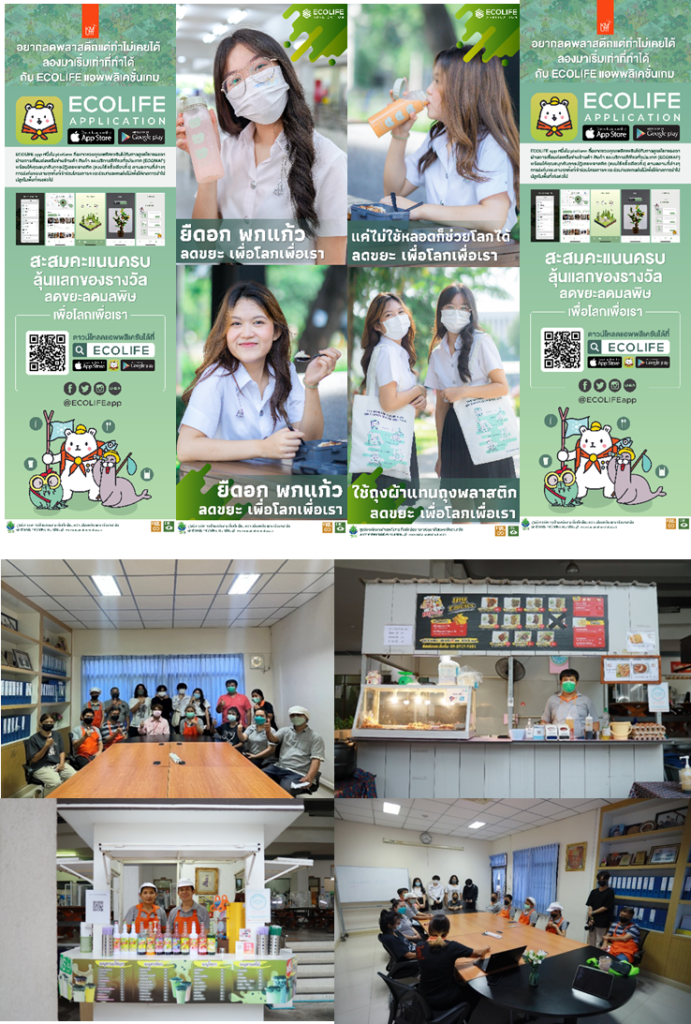
KMUTT is one of the participants in the GC YOU Turn Platform project, which is a platform that brings used plastics back into the waste management process systematically and has digital storage data. KMUTT has become a collection point for used plastic bottles. Students interested in joining this activity brought plastic bottles to be collected and sent. Waiting for GC YOU to pick up the plastic bottles and take them to the plastic waste separation center. The PET and HDPE plastics will be sent to the ENVICCO factory. To process recycled plastic pellets that meet standards and are ready to forward them to add value to various products. Plastic collected through GC YOU Turn will be considered for reducing greenhouse gas emissions.

3. Related information on our university having a policy on preventing and reducing marine pollution of all kinds, in particular from land-based activities.
| Policy to reduce the use of single-use plastics (Single use Plastics) as follow |

1. Request that all shop owners, convenience stores, and food shops in the university in all educational areas stop providing plastic bags, except for ready-to-eat cooked food, starting from July 25, 2018 onwards.
2. Request that all shop owners, convenience stores, and food shops in the university in all educational areas not provide plastic spoons, forks, and straws if they have not received a request from customers or have not asked customers first.
3. Request that all units in the university publicize, campaign, remind, and instill awareness, as well as create additional related announcements if necessary, so that everyone in the unit can reduce and stop using single-use plastics, and strictly comply with the law for sustainable health and the environment.
KMUTT Waste Management Policy
KMUTT provides waste management system and encourages student and staff to reduce, reuse, recycle and proper management on treatment and disposal which comply to standard practice and SDG2030. Both municipal solid waste and hazardous waste are managed according to waste hierarchy of reduction, reuse, recycle, treatment and responsible disposal. KMUTT is committed to
1.Waste minimization and waste reduction : Encourage waste source reduction by using the waste minimization and reduce hazardous chemical usage and encourage using products that can be reused or recycled.
2.Reuse and repair : Encourage to reuse equipment, materials or chemicals and repair equipment, materials that can be efficiently use.
3.Recycle: Encourage to recycling of Aluminums and steel cans, cardboard, glass bottles, paper, plastic cartons, scrap metal, shoe bank, textile bank, toner and ink jet cartridges by using recyclable waste bank. Also, encourage to recycling hazardous materials or chemicals if it can be efficiently done.
4.Treatment : Encourage to manage both municipal solid waste and hazardous waste in standard practices and meet regulations on waste treatment.
5. Responsible disposal : Ensure disposal in both municipal solid waste, hazardous waste and electrical waste (E Waste) are carried out in standard practices and meet regulations. Ensure all waste are managed with manual and followed standard practices.
| KMUTT Waste Management Policy |
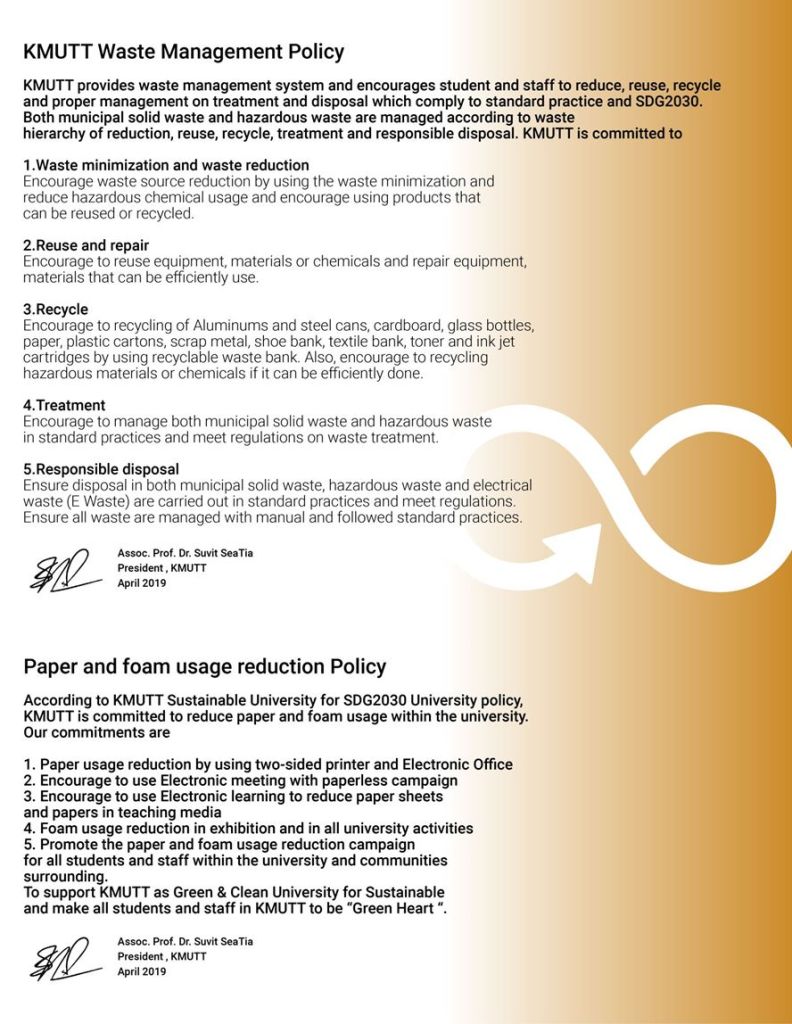
Paper and foam usage reduction Policy
According to KMUTT Sustainable University for SDG2030 University policy, KMUTT is committed to reduce paper and foam usage within the university. Our commitments are
1. Paper usage reduction by using two-sided printer and Electronic Office
2. Encourage to use Electronic meeting with paperless campaign
3. Encourage to use Electronic learning to reduce paper sheets and papers in teaching media
4. Foam usage reduction in exhibition and in all university activities
5. Promote the paper and foam usage reduction campaign for all students and staff within the university and communities surrounding.
To support KMUTT as Green & Clean University for Sustainable and make all students and staff in KMUTT to be “Green Heart “.
In addition, KMUTT has actively addressed the impact of plastic pollution on aquatic health by producing educational media and posters to inform new students about the severe consequences plastics have on marine life and ecosystems. Plastic waste, such as bottles and bags discarded into the ocean, poses a growing threat to marine animals like fish, turtles, and seabirds, which often mistake plastics for food. Consuming these materials can block their digestive tracts, leading to malnutrition and sometimes death. Plastics also damage aquatic habitats; when they accumulate on coral reefs, seagrasses, and along coastlines, they disrupt natural habitats and food sources for numerous marine species. This crisis extends beyond marine life, as the degradation of ocean ecosystems ultimately impacts human health and well-being. Reducing plastic use and promoting sustainable waste management practices are crucial steps toward preserving the environment and maintaining the health of marine ecosystems.
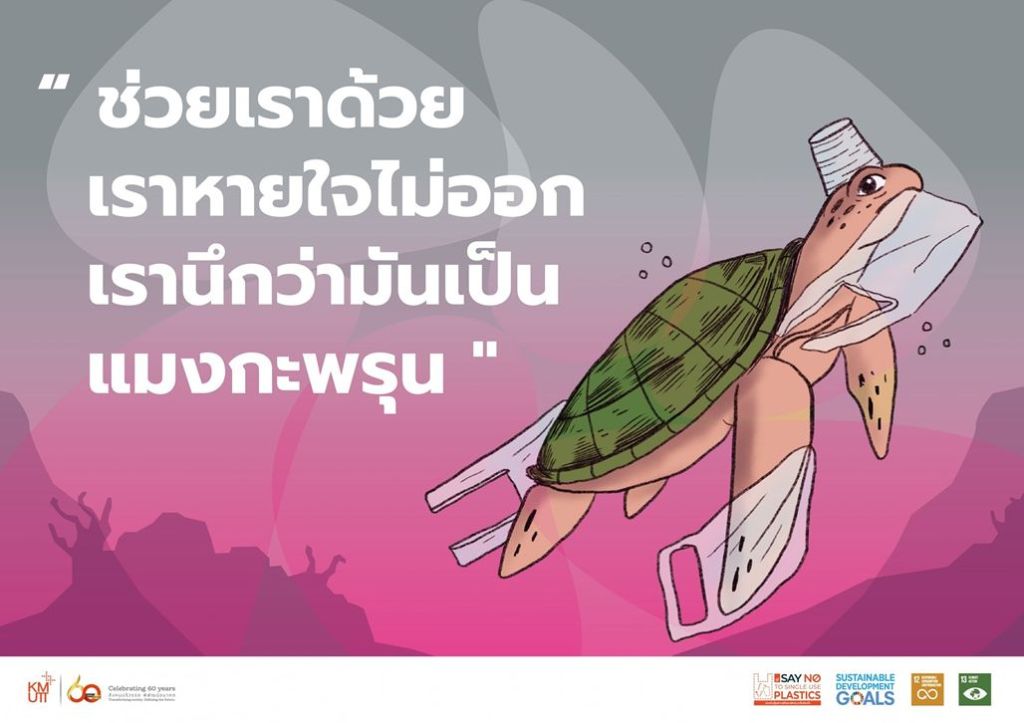
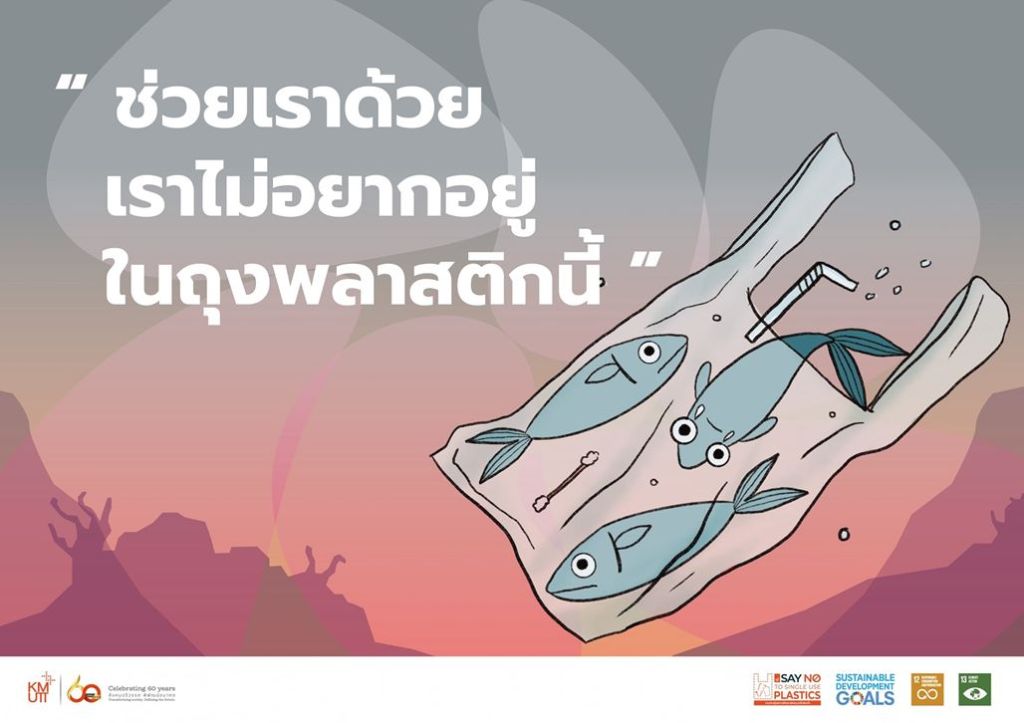
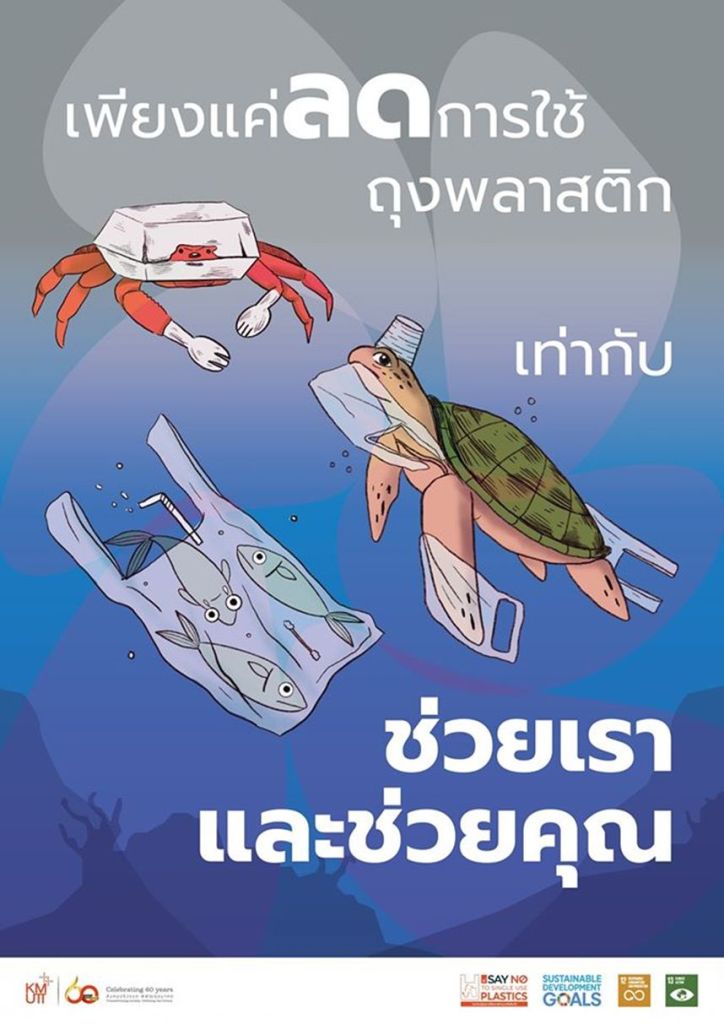
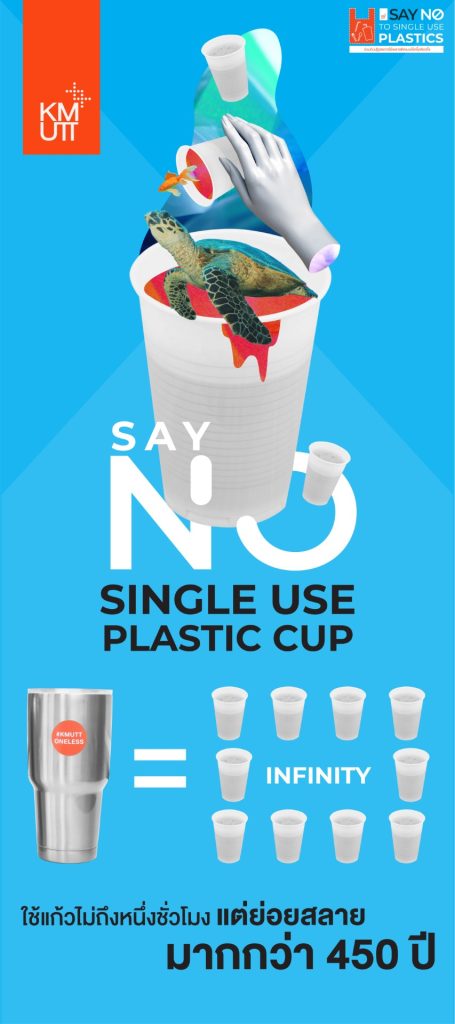
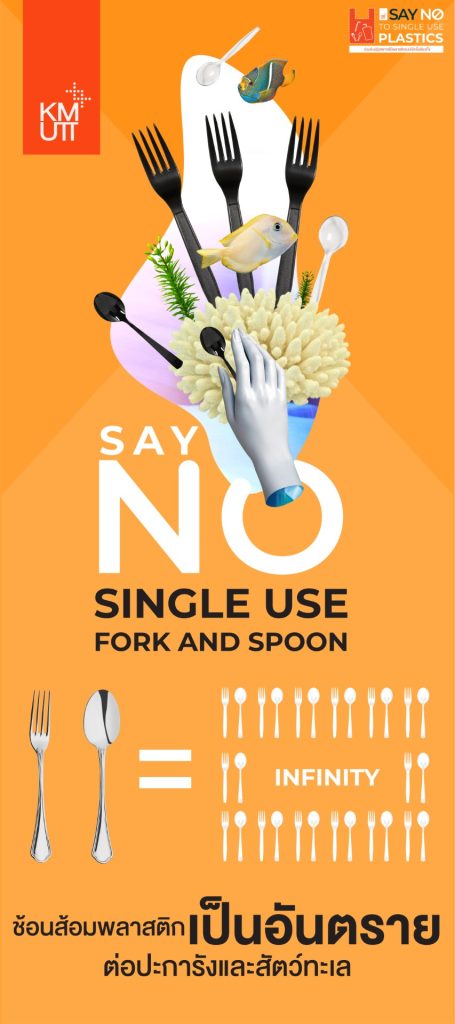
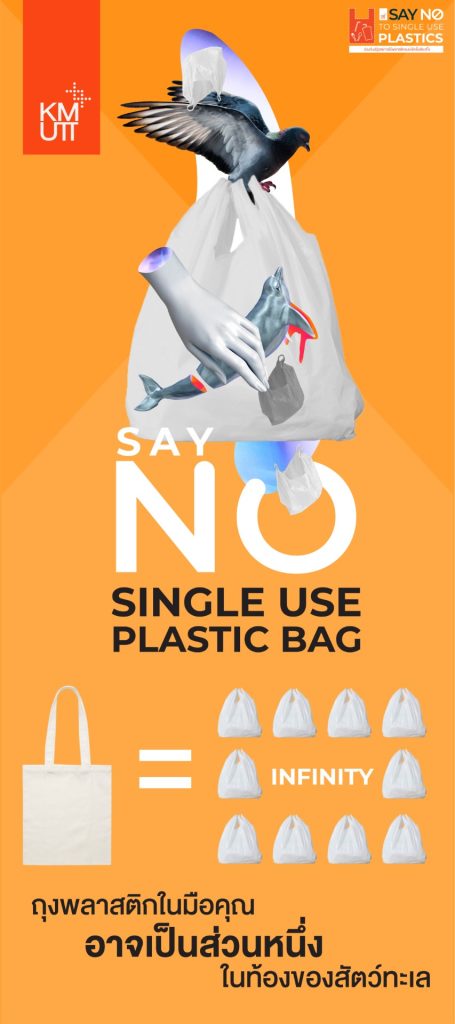
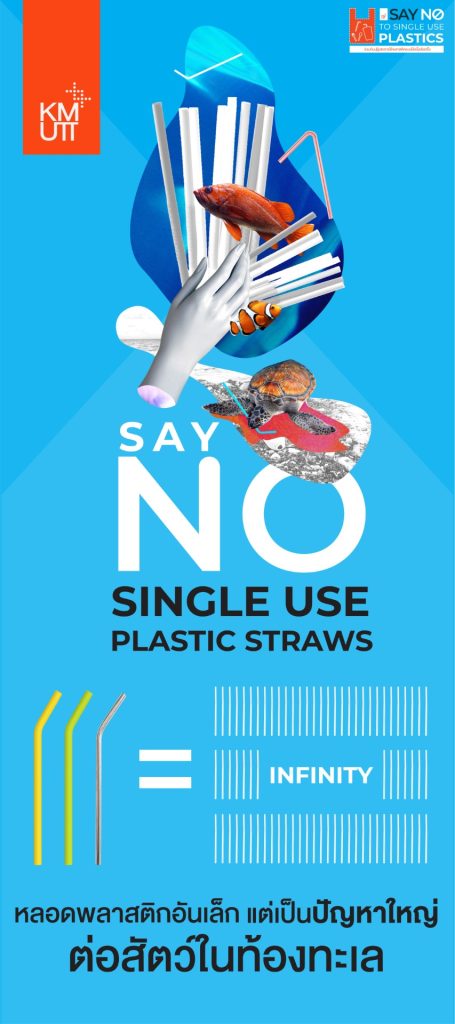
14.5 MAINTAINING A LOCAL ECOSYSTEM
1. Related information on our university having a plan to minimise physical, chemical and/or biological alterations of related aquatic ecosystems.
KMUTT has implemented an action plan to minimize the impact of its activities on aquatic ecosystems by closely monitoring and managing water discharge and hazardous waste. Water discharged from the university is rigorously tested on a monthly and quarterly basis, with samples collected from various buildings and pumping stations across campus to ensure compliance with environmental standards. In addition to water quality monitoring, KMUTT has established a hazardous waste management system, which involves the collection and safe disposal of hazardous waste twice a year, further supporting the university’s commitment to reducing physical, chemical, and biological impacts on surrounding ecosystems.
1. Water pollution control and monitoring in campus area KMUTT conducts regular monitoring of treated water quality before it is discharged into public water sources. Key parameters measured include pH, suspended solids (SS), biochemical oxygen demand (BOD), total Kjeldahl nitrogen (TKN), chemical oxygen demand (COD), and levels of fat, oil, and grease. These parameters are measured in compliance with standards set by the Ministry of Natural Resources and Environment for wastewater discharge from specific types and sizes of buildings. In addition, heavy metals such as arsenic, mercury, cadmium, and chromium are also being tested, which are highly hazardous metals that cause severe environmental impacts if released into water sources without standard treatment. This is because these heavy metals cannot naturally decompose and have the potential to accumulate in the environment, including living things, in the long term. The release of heavy metals exceeding the specified standards may cause harm to human and animal health, especially accumulation in aquatic animals, which are an important food source for humans. Therefore, it is necessary to monitor and control the number of heavy metals contaminated in the university’s wastewater under the standards set by the Ministry of Industry to prevent contamination and long-term impacts on the ecosystem

2. Chemical hazardous waste generation from the Laboratory
More than 2,000 chemical substances are handled in educations and researches laboratories and nearly 12 tons of Hazardous waste was generated in each year. Therefore, Hazardous waste management system for laboratory is set up by Energy Environment Safety and Health organization (EESH) in 2007. The main concept of system is chemical substance collection (Ignitability, Corrosivity, Reactivity and Toxicity), storage and disposal of waste. In recent year, system is continue improving and developing under the standard of Enhancement of Safety Practice of Research Laboratory in Thailand or ESPReL. This system is consists of three steps, including of waste segregation, waste storage and collection and waste treatment. The following detail below present the waste segregation methods which are applied within campus. To ensure that hazardous waste is handled in a good manner that protects human health and the environment, hazardous waste container have been provided to all laboratories according to laboratory request form which is one category in Hazardous waste segregation manual.
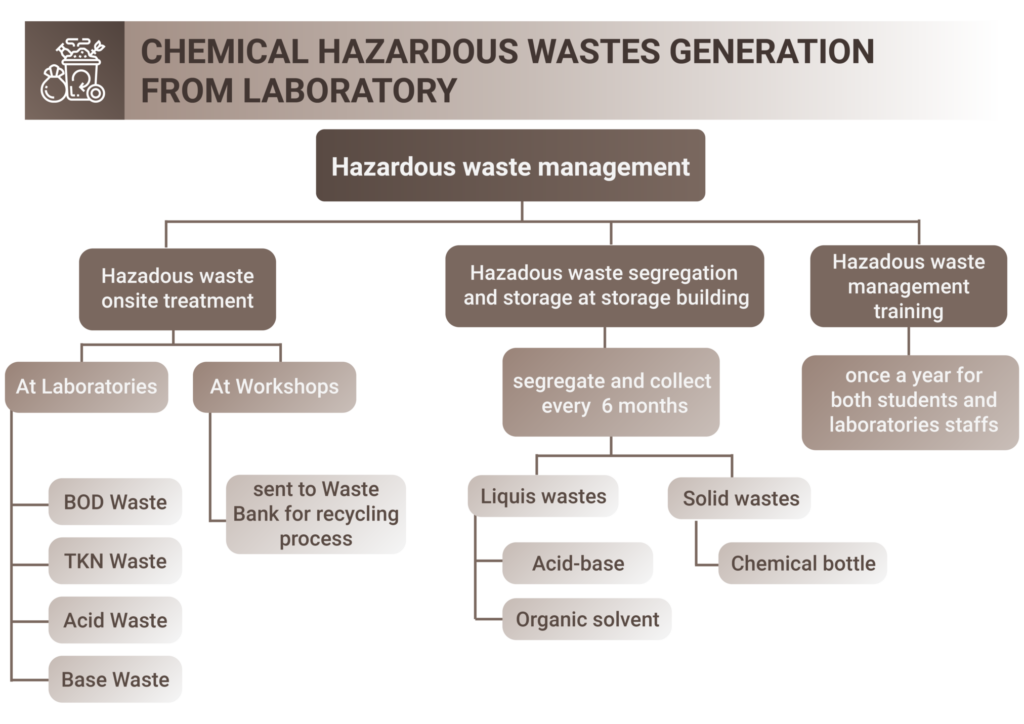
The Liquid Hazardous waste segregation
At laboratory, liquid hazardous waste is separated into 18 types including L01 Acid waste, L02 Base waste, L03 Salt waste, L04 Phosphorus/Fluoride waste, L05 Cyanide waste, L07 Chromium waste, L08 Mercury waste, L10 Arsenic waste, L11 Heavy metal ion waste, L12 Oxidizing agent, L13 Reducing agent, L14 Combustible waste, L15 Oil waste, L16 Halogen waste, L17 Water complex solution, L18 Flammable waste, L19 Fixative solution waste and L20 Explosive waste. After the experiment, those liquid hazardous waste were segregated and kept in provided container before treated. The briefly process for Liquid Hazardous waste segregation are including
- Fill types and concentration of each chemicals in form EESH-HZW 01
- Compare concentrations of used chemicals with wastewater drainage standard of DIW. If do not comply with the standard. Consider the next step. But If comply with the standard. That chemical is not taken into account.
- Compare concentrations of chemicals in final wastewater with wastewater drainage standard of DIW. If do not comply with the standard. Consider the next step. But If comply with the standard. Dumped into the sewer.
- Segregate types of liquid hazardous waste by use KMUTT’s Hazardous Waste Segregation Flowchart.
- Record the type of segregated waste in form EESH-HZW 01

The Solid Hazardous waste segregation
Solid hazardous wastes have been separated into 5 categories according to physical properties. At laboratory, Hazardous waste segregation flow chart and criteria would be provided to inform for researcher. Physical properties of solid hazardous waste is consists of S01 Used bottles, S02 Broken glasses ware, S03 Toxic waste, S04 Organic waste and S05 Chemical Contaminated waste. Besides, Ethidium Bromine Waste, Radioactive waste L21, Organic waste L22 and Pilot Plant Activities waste L23 is given special attention for waste segregation and treatment.
Hazardous waste storage
The standard from Environmental Laboratory Advisory Board (EPA) is used as a guideline for hazardous waste storage. Waste storage area should be well air circulated, cool and dry place, no ignition source with poster and signage. The location of Hazardous waste storage within campus are compose of hazardous waste storage area in laboratory, hazardous waste storage area within laboratory building and hazardous waste building center.
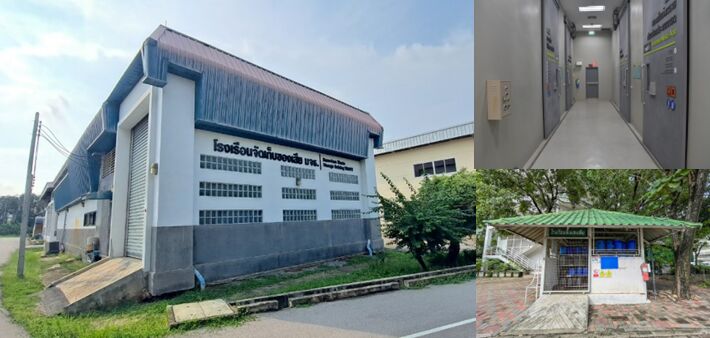
Hazardous waste collection
To ensure that hazardous waste is handled in a good manner for protecting human health and environment, hazardous waste container have been provided to all laboratories. All liquid hazardous waste container are made from Polyethylene. Each liquid hazardous waste container is labeled to indicate the type of hazardous waste. These liquid hazardous wastes will be kept in waste storage area in laboratory. Once a month all containers would be move to Hazardous waste building at KMUTT’s Bangkhuntein campus. The example of solid hazardous waste is broken glassware, empty chemical bottles, expired chemical or used spill whereas special hazardous waste are including radioactive waste, pilot plant activities waste, EtBr waste and biological waste. According to KMUTT hazardous system, solid hazardous waste should be kept in a proper container with specific label to indicate types

2. Related information on our university on monitoring the health of aquatic ecosystems.
Monitoring the health of KMUTT’s aquatic ecosystem involves collecting and analyzing water samples from wells and discharge points to public water sources. This analysis includes assessment of key water quality parameters such as pH, total suspended solids (SS), biological oxygen demand (BOD), total Kjeldahl nitrogen (TKN), total soluble solids (TDS), sulfides, fats, oils, and grease (FOG), and the presence of heavy metals such as arsenic, mercury, cadmium, and chromium. These parameters are important to ensure that the discharged water does not have a negative impact on the community and the surrounding environment, which is home to both freshwater and saltwater plants such as Acacia, Acacia, and Acacia. These plants form a micro ecosystem that is home to a wide variety of wildlife, including many birds and insects, which can be used as biological indicators. Monitoring bird populations over different seasons provides insights into the health of the ecosystem, as changes in species diversity and abundance can signal changes in environmental quality. Such comprehensive monitoring helps maintain the balance of the ecosystem, which benefits both biodiversity and community well-being.

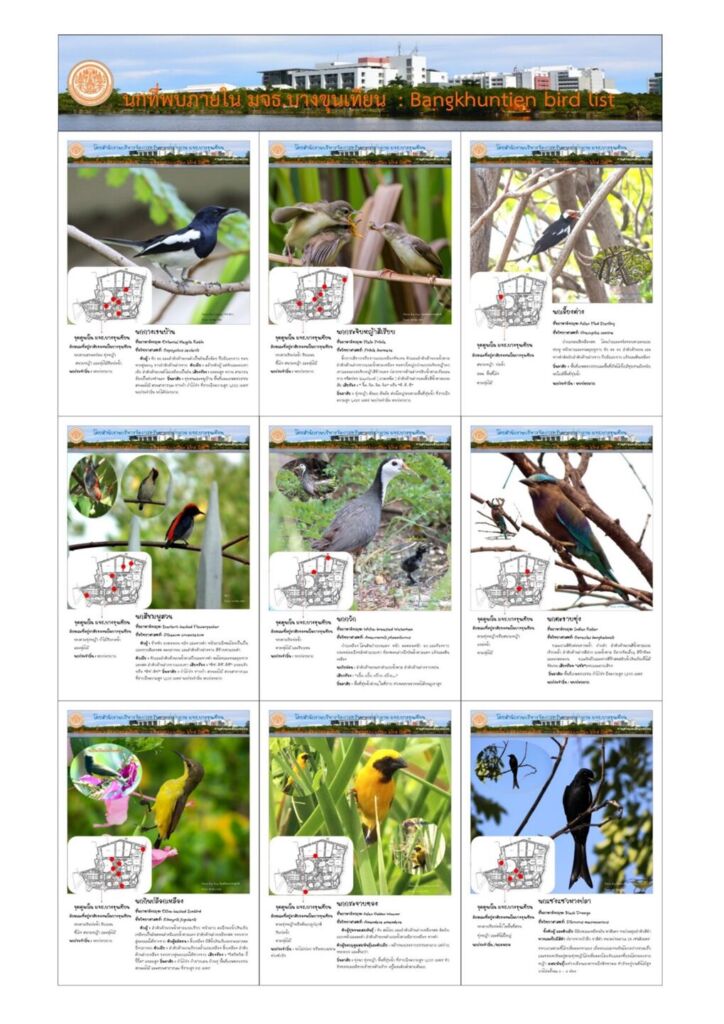
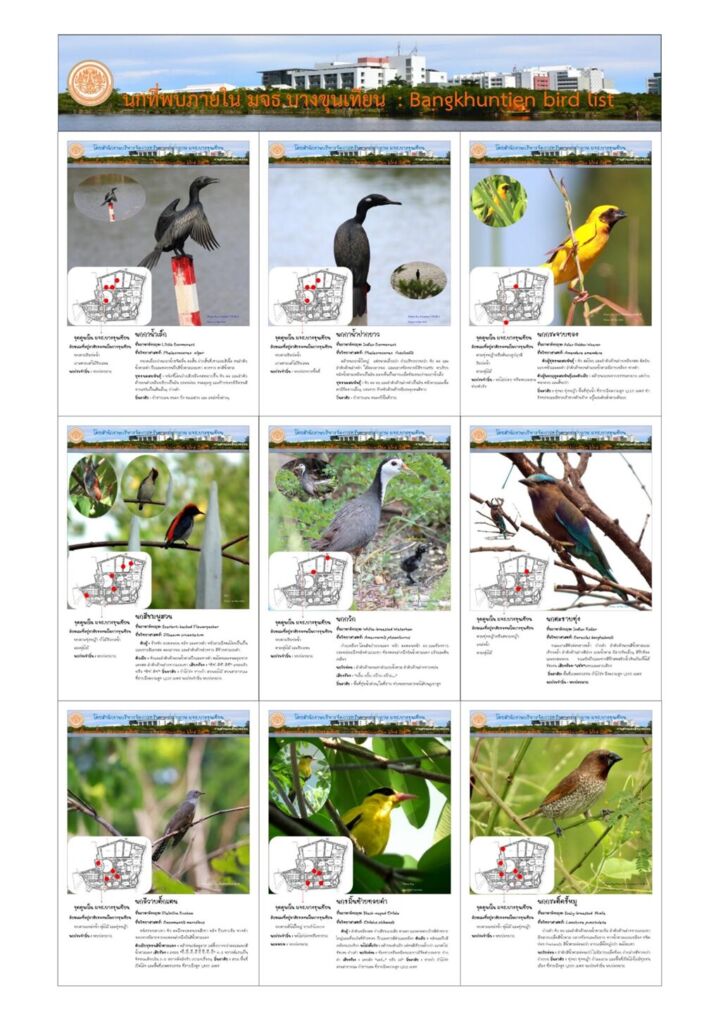
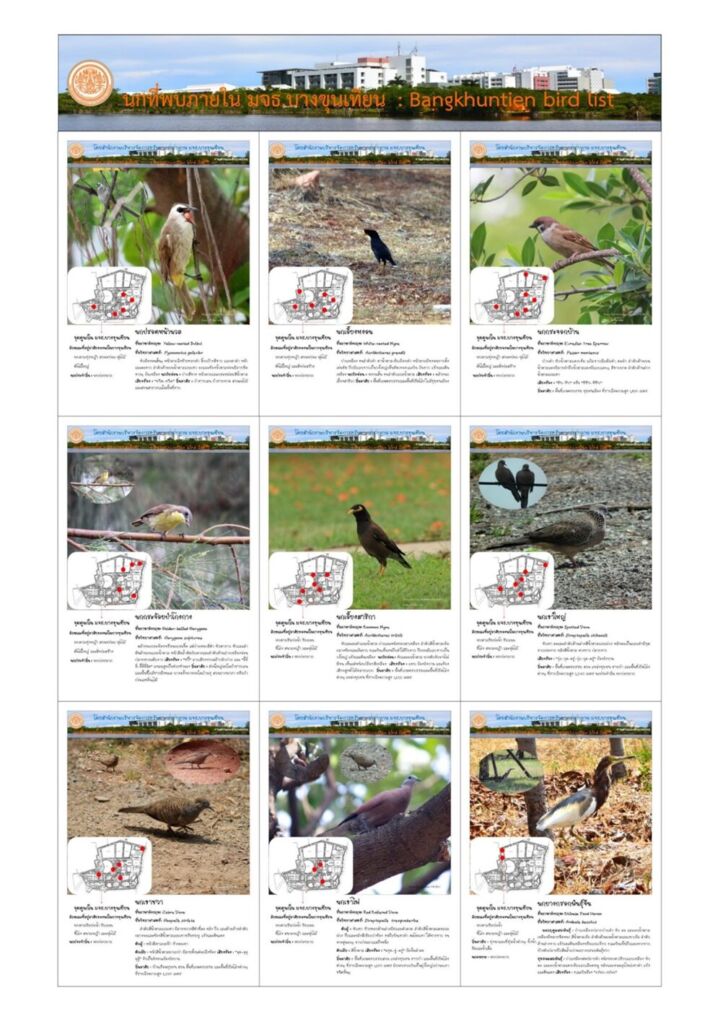
3. Related information on our university on developing and supporting programs and incentives that encourage and maintain good aquatic stewardship practices.
KMUTT, in collaboration with the Thung Khru District Office, Bangkok and local civil society networks, organized the “Open House, Open Khlong, Open Bangmod” event under the concept of “Connecting Rivers, Unity, Power”. The event will consist of various activities organized by the community, such as a food festival from local vendors, shops from mosques and Blue Flag shops, as well as traditional competitions such as a garbage collection boat race, a yo-yo competition, a garbage collection boat race and a long-tail boat race. Other highlight activities include a boat trip in Khlong Bangmod, a tour of the garbage market and a demonstration of how to make an eco-friendly compost bin. There will also be a Kingdom performance contest, seminars and health check-ups throughout the 3 days at the Nurul Huda Mosque Cultural Square, Soi Phutthabucha 36, Intersection 8, Thung Khru District, every day from 12:00 to 21:00. These projects aim to promote responsible water management, waste reduction and conservation efforts within the community by integrating local participation with

systematic environmental management approaches. The project aims to promote a shared commitment to water conservation and promote sustainable practices in the community, which will help create health and unity in the Bangmod area.
The SAFETist FARM group is a group of new generations with the idea of creating a “community learning and innovation center” in organic agriculture along with tourism on an area of about 3-4 rai along the Bangmod Canal, Thung Khru District, located in Soi. Pracha Uthit 76, intersection 9, made into a vegetable plot Raising good-natured chickens, fish ponds, houses for breeding striped fly larvae or black soldier worms, nature learning activities for children-youths and families for a sustainable ecosystem and environment As well as biodiversity, faculty members and university staff have visited the area for study visits. Including discussing ways and possibilities to develop sustainable cooperation and learn together.

4. Related information on our university on collaborating with the local community, e.g. through partnerships, in efforts to maintain shared aquatic ecosystems.
In each year, various campaigns and activities are organized by KMUTT’s students and staff. Those activities are aimed to create awareness on hazardous waste and water pollution. Not throw garbage into Bang Mot Canal campaign is the example where KMUTT as a body collaborate with the local community like bike club together with Thung Khru District Office. This activity not only help to maintain the cleanliness of the Bang Mot Canal and sewage prevention, but also bring surrounding communities work together along Bang Mot Canal.

KMUTT bike club has been involved with Wat Chak Daeng, communities and other organizations. Participate in a volunteer activity to create a floating buoy to trap waste from plastic bottles at Wat Chak Daeng by using a floating buoy to trap waste at the waterfront of Wat Chak Daeng. In order to prevent waste flowing into the sea Reduce the problem of marine litter That will affect the environment such as aquatic animals, aquatic plants, etc. and to help protect the environment. And cause less pollution to the world

The context of the Thonburi area consists of waterfront areas and green areas together forming the Cool Spot of Bangkok, partly because the lifestyle of some people in the community still uses the canal route. for commuting and live in agriculture that relies on natural water sources from the canal Even when there is more prosperity and more road cuts The canal has therefore been reduced. The water course has changed. A team of professors and researchers from the Faculty of Architecture and Design and networks both within and outside the country Has conducted a project to survey the canal route in the Thonburi side as a pilot in 4 districts, namely Thung Khru District, linking to Chom Thong District, Thonburi District and Khlong San District, to study the water quality of the canal. (Faculty of Science measure the salinity of the water total dissolved solids amount of dissolved oxygen) Environmental quality (measurement of air, temperature (Temperature Control), wind load (Wind Load) and dust value PM 2.5) including the potential of the riverside community. Hope to connect the canal travel route for tourism and a route connecting the canal route in the area If in the future there is a BTS SkyTrain route and the Metropolitan Rapid Transit (MRT) in all areas will be able to connect together to increase the potential or the possibility of expanding the transportation routes to be more comprehensive and flexible. Create maximum benefits for people in the community and tourists.
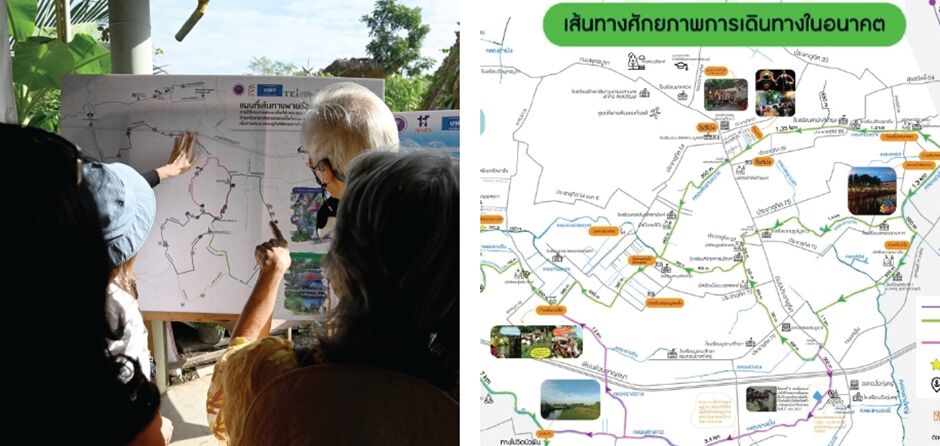
5. Related information on our university having implemented a watershed management strategy based on location specific diversity of aquatic species.
The breeding and release of the stingray by KMUTT in collaboration with the Promotion Center, the Royal Project Foundation, and local communities is an important component of a local watershed management strategy that emphasizes sustainable biodiversity and ecosystem integrity. Since 2016, these efforts have focused on breeding the stingray in a controlled environment at the Demonstration Garden of King Mongkut’s University of Technology Thonburi, Nan Province, using a large number of wild-caught, nurtured, and released broodstock (30,000 fish) back into the Mang River. The project aims to restore the local aquatic ecosystem and provide a sustainable protein source for the community. This local species restoration and controlled breeding strategy integrates with broader watershed management goals by promoting biodiversity specific to the aquatic ecosystem of Nan Province. The release of the stingray enhances natural aquatic diversity while providing the community with a sustainable and naturally replenished source of protein. As the fish adapt and thrive in their native habitats, they contribute to the ecological balance of the river, supporting an environmentally sustainable watershed management strategy that benefits the local community economically.

KMUTT together with Rajamangala University of Technology Lanna Nan brought the RAS system model that was studied and experimented to improve for testing farming in highland areas and experimenting for learning in the community. using the area of the KMUTT coordination center located in Bo Kluea District Organized as an experimental set of 10 cubic meters and at the community as a learning set, size 500 liters, and has designed and provided equipment for installing the RAS system. for tilapia farming which consists of culture pond (Made from a circular plastic tank with a diameter of 4 meters, containing 10 cubic meters of water.) and wastewater treatment system from farming which consists of solid filter system biological filtration system (Bio-filter) and hydroponic soilless plants to help absorb nutrients in wastewater. has also prepared a biological filter system by immobilizing nitrifying bacteria (Nitrifying Bacteria) on biological filter material (Bio-ball) to make the filter system effective in treating wastewater.

le. (International Publication)


